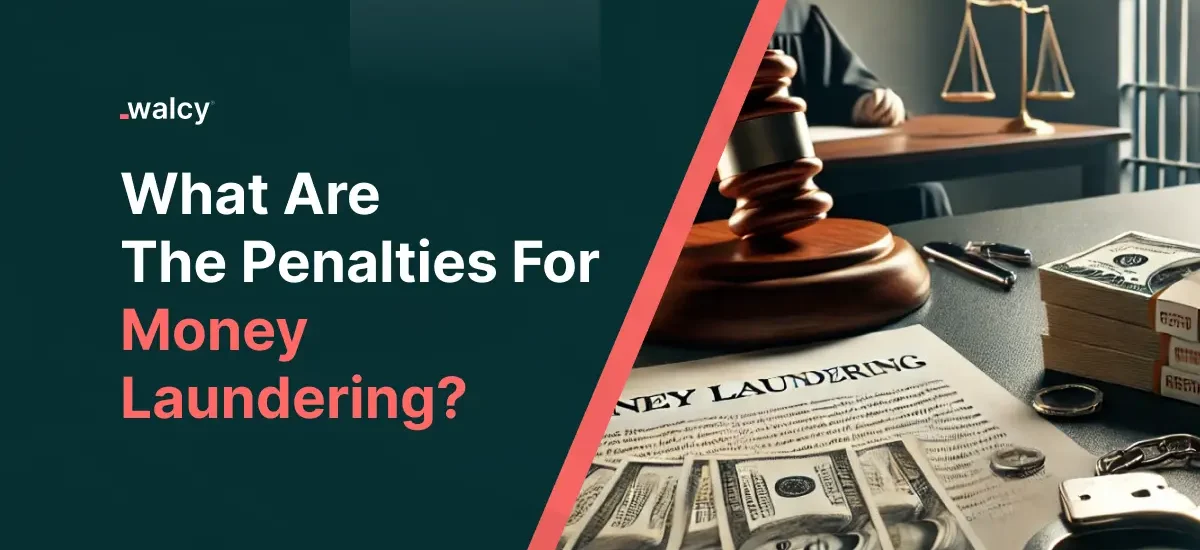Money laundering is a diverse offense that entails hiding the origins of unlawfully acquired funds or assets. This illicit practice is utilized by an array of individuals and groups such, as tax evaders, criminal organizations, corrupt government officials, and even terrorists. As we already know about “what money laundering is” in the previous blog, we will discuss the penalties for money laundering here.
The primary objective of money laundering is to legitimize unlawfully acquired funds by making them appear to originate from sources. This deceptive tactic allows criminals to evade consequences and freely utilize their gains. Money laundering not only facilitates criminal endeavors but also poses a threat, to the integrity of global financial systems.
Overview
Money laundering has been a topic since the Bank Secrecy Act was enacted in 1970 in the United States. Individuals convicted of money laundering face consequences, such, as fines and lengthy prison sentences as it is considered a major financial offense.
To date, only a few people truly understand the penalties for money laundering. Every day, new cases are being explored globally, and because of this, it has been a critical issue for the global financial system. To solve this issue, it is crucial to let people know about the consequences. As the laws will differ across borders, we will learn about the punishment one must face if accused of money laundering in several nations. In addition to penalties for money laundering, we will explore details on the penalty for aiding in money laundering, duration of imprisonment, money laundering regulations, and more.
Penalties For Money Laundering
It’s important to know what might happen after being accused of money laundering, especially if it puts you in legal trouble. As mentioned already the penalties for money laundering might differ in different countries. It means you might need to bear different punishments in India as compared to the USA. Here we will list out the penalties for money laundering in a few major countries like the USA, Singapore, Nepal, India, the UK, etc.
Penalties For Money Laundering In The USA
Money laundering is one of the most grievous offenses in the United States. Though there isn’t any minimum sentence requirement for money laundering, there are a couple of very stringent regulations. The United States Sentencing Commission takes a relatively narrow definition of money laundering so the sentencing is much harsher than it would be if the activity had penetrated anything attached to it.
On conviction of money laundering, an accused person should be liable to a maximum penalty of 20 years of imprisonment and fines of up to $500,000 or double the amount of the property involved in the transaction, whichever is greater.
There could also be penalties for other associated crimes against criminals who engage in the criminal activity of laundering money. For example, 18 U.S.C. Section 1957 has a maximum sentence of ten years for depositing or using $10,000 plus of the proceeds derived from activity that violated U.S.C. Section 1956.
Penalties For Money Laundering In Singapore
Former senior minister and Monetary Authority of Singapore (MAS) chairman Tharman Shanmugaratnam said in July that the organization had fined 17 financial institutions for breaking the nation’s anti-money laundering and anti-terrorist financing laws during the preceding five years. Fourteen financial institutions got fines, while one, out of the seventeen, had its license revoked. The two that were left received reprimands.
Swiss Life Singapore, DBS Bank, OCBC Bank, and Citibank Singapore were among the financial institutions subject to sanctions. These four companies were fined S$3.8 million for breaking the law and neglecting to get across the proper procedures after being linked to the network.
A person found guilty of money laundering in Singapore faces a maximum term of 10 years in jail, a maximum fine of S$500,000, or both, according to Section 54 of the CDSA. The Payment Services Act (PSA) in Singapore is another framework that outlines the requirements that payment service companies must meet legally.
MAS, the authorized entity in charge of payment compliance oversight, pursues allegations of money laundering in Singapore’s financial institutions.
Source: https://singaporelegaladvice.com/law-articles/anti-money-laundering-laws-and-you/
Penalties For Money Laundering In UK
In the UK, Money laundering violations are investigated by the National Crime Agency (NCA), HM Revenue and Customs, or law enforcement. The Crown Prosecution Service usually handles criminal cases. Massive or complex fraud or corruption cases are investigated and prosecuted by the major Fraud Office. money laundering is also considered a complex fraud in the UK. If there is a connection between the claims and actions or firms that are under supervision, the Financial Conduct Authority (FCA) has the authority to investigate or file charges.
In the UK, both natural and legal individuals are subject to criminal culpability. As a result, a company that violates laws against money laundering may be prosecuted.
The maximum penalty for substantial money laundering offenses under POCA is 14 years in jail, an infinite fine, or both. The maximum sentence for not disclosing, interfering with an inquiry, and tipping off is two years or five years in jail, respectively, or an indefinite fine, or both. These offenses can be tried either immediately or on an accusation basis.
Source: https://www.patrickcannon.net/practice-areas/financial-crime/money-laundering/
Penalties For Money Laundering In India
Studies show that money laundering in India might amount to as much as INR 15,55,000 crore per year. The Prevention of Money Laundering Act (PMLA) of 2002 regulates all money laundering-related frauds in India.
Money laundering is prohibited by section 4 of the PMLA and carries a three-to-seven-year prison term. The Narcotic Drugs and Psychotropic Substances Act of 1985 stipulates a ten-year maximum sentence.
When someone is charged with money laundering, they might face a variety of penalties, including jail time, fines, non-bailable offenses, warrantless arrests, disqualification from elections, etc.
Source: https://restthecase.com/knowledge-bank/punishment-for-money-laundering-in-india
Penalties For Money Laundering In Nepal
In Nepal, there has only been one instance of money laundering so far. But in that instance, Nepal’s Special Court sentenced seven people to prison terms and fines ranging from NPR 70 million to NPR 3.61 billion in February 2020.
Financial institutions that violate AML/CFT regulations in Nepal may be punished between NPR 1 million and NPR 50 million, according to the country’s anti-money laundering Act of 2008. Additionally, there is a narrow range of NPR 100,000 to NPR 10 million for other reporting bodies.
A fine equal to one to three times the amount involved in the money laundering violation is levied under the Asset (Money) Laundering Prevention Act, 2008, along with a sentence of three to ten years in jail.
The court can also order the confiscation of the property involved in the money laundering offense.
Money Laundering Defence strategies.
Knowingly and unknowingly people get accused of money laundering several times. You might not have done it intentionally but the police have already arrested you. In this context, you need a money laundering defense strategy.
Popular defensive tactics include the following:
- Absence of Intent:
Your legal representative may be able to prove that you had no idea the funds came from illicit sources.
- Inadequate Proof:
The government must demonstrate without a reasonable doubt that you participated in money laundering. To help you escape being found guilty, your lawyer may argue that the evidence is weak or nonexistent.
- Evidence Obtained Illegally:
In court, evidence that has not been legally obtained may not be admitted. Your lawyer can carefully review every detail of your case to look for mistakes or rights breaches.
Conclusion
As the global financial landscape is becoming narrower every day, it is suggested for everyone not to be involved in money laundering. If you get accused, intentionally or unintentionally, the penalties for money laundering would be hectic. Though it will differ between countries, you will certainly need to face imprisonment and hectic fines.
Nobody should encourage such fraudulent activities. If you need to make foreign transactions, you can simply use Neobanks like Walcybank for smooth and transparent transactions. You can also easily open Global accounts and make Global Payments across borders with unbeatable FX rates.
Learn about b2b international payments, Cheapest way to transfer money abroad.
Do follow us on Facebook and Linkedin, to stay connected with us.



